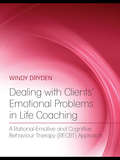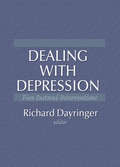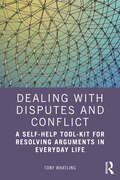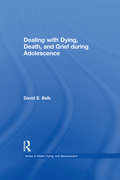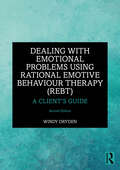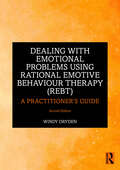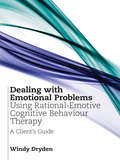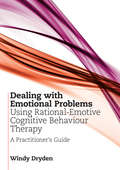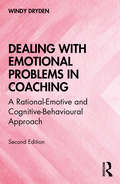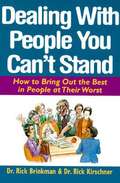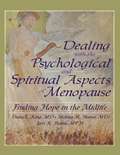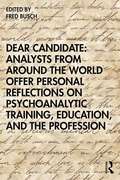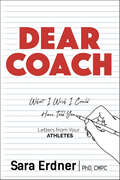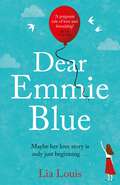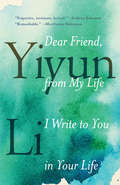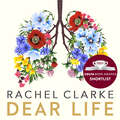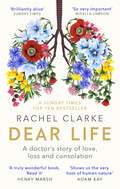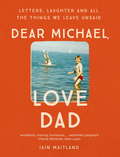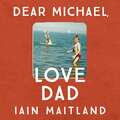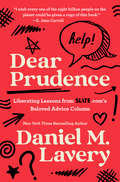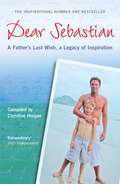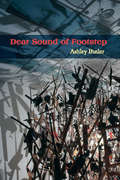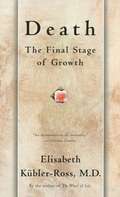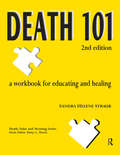- Table View
- List View
Dealing with Clients' Emotional Problems in Life Coaching: A Rational-Emotive and Cognitive Behaviour Therapy (RECBT) Approach
by Windy DrydenThis book is a comprehensive guide for life coaches on how to react and adapt when emotional problems get in the way of coaching. Windy Dryden uses Rational-Emotive Cognitive Behaviour Therapy (RECBT) techniques to offer advice on: when it is and is not appropriate to work on emotional problems when the coach should refer the client to someone else, such as a psychotherapist or counsellor how to use RECBT to help clients with their emotional problems within a life coaching context at what point it is sensible to begin coaching again. Dealing with Clients' Emotional Problems in Life Coaching will be a valuable resource for all those involved in life coaching.
Dealing with Depression: Five Pastoral Interventions
by William M Clements Richard L DayringerThis important book explores strategies to enable clergy and lay persons to identify and help individuals suffering from depression. It contains many techniques that can be used in managing depression, including coping devices, treatments, and interventions which actually help depressed persons to improve their mental health. Dealing With Depression describes types of depression and related symptoms to help clergy develop a more complete understanding of the disorder. They will learn to recognize the symptoms of depression and be better able to help individuals who suffer from it. This useful guide includes a step-by-step approach to depression intervention and proven techniques readers can use to enable people to cope more successfully with depression. This important book has also been translated into a Chinese version. Dealing With Depression brings together expert psychologists who explore five modalities for conceptualizing and managing depression, which deflates for clergy the often intimidating quality of the disorder. These experts discuss in practical and understandable ways the helping techniques they use and explain their understanding of depression and their methods of treatment. A medical-religious case conference with these experts shows how clergy and laity can help ease depression and an extensive bibliography is included to facilitate further reference. Dealing With Depression puts this common disorder back into the human life situation where it can be seen as just another temporary disturbance to which human beings are vulnerable, but which need not significantly distort their lives, relationships, spiritual development, or prosperity of body, mind, and soul.
Dealing with Disputes and Conflict: A Self-Help Tool-Kit for Resolving Arguments in Everyday Life
by Tony WhatlingDealing with Disputes and Conflict: A Self-Help Tool-Kit for Resolving Arguments in Everyday Life offers accessible and practical strategies and solutions to guide untrained mediators and readers on effective ways to resolve disputes and conflict, across a wide range of dispute contexts. Drawing together psychological and social scientific theories, the author offers clear guidance for managing conflict in everyday life, ranging from experiences at work, with the community or at home. This book defines mediation practice, its key principles, and how it is structured and implemented, and offers practical strategies based on key theories, including Transactional Analysis. Tony Whatling draws on his extensive experience as a professional mediator, consultant, trainer and author, to create this valuable practical guide. Including a toolbox outlining core skills and strategies applied by trained practitioners, the book covers important elements in conflict resolution, such as apology, reconciliation, the importance of listening and concentration, and what to try when disputants do not respond. Case studies from various contexts are featured, giving readers the tools they need when faced with disputes relating to situations such as divorce and workplace disagreements. Exploring the building blocks of dispute management through an engaging and clear tone, this text is ideal for mediators, dispute resolution specialists, volunteers, community leaders, medical staff and anyone embarking on a career in mediation, as well as individuals hoping to resolve conflict in their own lives.
Dealing with Dying, Death, and Grief during Adolescence: Dealing With Dying, Death, And Grief During Adolescence (Series in Death, Dying, and Bereavement)
by David E. BalkFor some, life’s introduction to death and grief comes early, and when it does it can take many forms. Not only does Dealing with Dying, Death, and Grief during Adolescence tackle them all, it does so with David Balk’s remarkable sensitivity to and deep knowledge of the pressures and opportunities adolescents face in their transition from childhood to adulthood. In seamless, jargon-free language, Balk brings readers up to date with what we know about adolescent development, because over time such changes form the backstory we need to comprehend the impact of death and bereavement in an adolescent’s life. The book’s later chapters break down the recent findings in the study of life-threatening illness and bereavement during adolescence. And, crucially, these chapters also examine interventions that assist adolescents coping with these difficulties. Clinicians will come away from this book with both a grounded understanding of adolescent development and the adolescent experience of death, and they’ll also gain specific tools for helping adolescents cope with death and grief on their own terms. For any clinician committed to supporting adolescents facing some of life’s most difficult experiences, this integrated, up-to-date, and deeply insightful text is simply the book to have. David E. Balk is professor in the department of health and nutrition sciences at Brooklyn College (CUNY), where he directs the graduate program in thanatology. He is the author of Adolescent Development: Early Through Late Adolescence, Helping the Bereaved College Student, and several other books on death and bereavement. He is also co-editor of the 2nd edition of the Handbook of Thanatology (Routledge, 2013).
Dealing with Emotional Problems Using Rational Emotive Behaviour Therapy (REBT): A Client’s Guide
by Windy DrydenThe second edition of Dealing with Emotional Problems Using Rational Emotive Behaviour Therapy: A Client's Guide offers clear, practical advice on how to deal with some of the most common emotional difficulties we face. Rational Emotive Behaviour Therapy (REBT) is a therapy approach that encourages a direct focus on emotional problems, helping you to understand the attitudes, thoughts and behaviours that lead you to maintain these problems. This understanding will enable you to overcome problems and lead a happier and more fulfilling life. The book begins by outlining foundations of emotional problems. Each problem is then presented in a similar way, allowing the reader to compare and contrast similarities and differences between each emotion, and teaching them how to cope with it. This book covers: • anxiety • depression • guilt • shame • hurt • unhealthy anger • unhealthy jealousy • unhealthy envy • and a new chapter on unhealthy regret. Featuring newly revised information and language on REBT, this Client’s Guide is an accessible, user-friendly guide that can be used on your own or in conjunction with a therapist who can use the Practitioner's Guide.
Dealing with Emotional Problems Using Rational Emotive Behaviour Therapy (REBT): A Practitioner's Guide
by Windy DrydenIn this practical companion to the client manual, Windy Dryden draws on Rational Emotive Behaviour Therapy (REBT) – an approach that focuses on identifying, examining and changing the rigid/extreme attitudes that largely determine emotional and behavioural issues – to encourage people to deal with their emotional problems. Including all of the information presented in the Client’s Guide with the addition of helpful hints and tips for the therapist, the Practitioner’s Guide is straightforward to use in the consulting room with no need for further references. It allows the therapist to work through and help the client learn to deal with their problems from an REBT perspective, covering: • anxiety • depression • guilt • shame • hurt • unhealthy anger • unhealthy jealousy • unhealthy envy • and a new chapter on unhealthy regret. This practical guide presents each emotion in a similar way, allowing the reader to compare and contrast common and distinctive features of each problem. With new REBT research and updated, accessible terminology, this new edition will remain essential reading for any professional using REBT with their client.
Dealing with Emotional Problems Using Rational-Emotive Cognitive Behaviour Therapy: A Client's Guide
by Windy DrydenDealing with Emotional Problems offers clear, practical advice on how to deal with some of the most common emotional difficulties. Rational-Emotive Cognitive Behaviour Therapy (RECBT) is a technique that encourages a direct focus on emotional problems, helping you to understand the thoughts, beliefs and behaviours that cause you to maintain these problems. This understanding will enable you to overcome problems and lead a happier and more fulfilling life. The book begins by outlining foundations of emotional problems. Each problem is then presented in a similar way, allowing the reader to compare and contrast similarities and differences between each emotion, and how to cope with it. This book covers: anxiety depression guilt shame hurt unhealthy anger unhealthy jealousy unhealthy envy. Dealing with Emotional Problems Using Rational-Emotive Cognitive Behaviour Therapy can be used on your own or in conjunction with a therapist who can use the Practitioner's Guide.
Dealing with Emotional Problems Using Rational-Emotive Cognitive Behaviour Therapy: A Practitioner's Guide
by Windy DrydenIn this practical companion to the client manual, Windy Dryden draws on Rational-Emotive Cognitive Behaviour Therapy (RECBT) – a form of CBT that focuses on challenging and changing the irrational beliefs that largely determine emotional and behavioural issues – to encourage people to deal with their emotional problems. This Practitioner's Guide includes all of the information presented in the Client’s Guide with the addition of helpful hints and tips for the therapist, making it straightforward to use in the consulting room with no need for further references. Dealing with Emotional Problems Using Rational-Emotive Cognitive Behaviour Therapy will allow the therapist to work through and help the client learn to deal with their problems from an RECBT perspective, covering: anxiety depression guilt shame hurt unhealthy anger unhealthy jealousy unhealthy envy. This practical Workbook presents each emotion in a similar way, allowing the reader to compare and contrast common and distinctive features of each problem. It will be essential reading for any professional using RECBT with their client.
Dealing with Emotional Problems in Coaching: A Rational-Emotive and Cognitive-Behavioural Approach
by Windy DrydenThis book is a comprehensive guide for coaches on how to use rational-emotive and cognitive behaviour therapy to help coachees with their emotional problems within a coaching context. In this fully updated new edition, Windy Dryden: discusses the eight major emotions that feature in coachees’ emotional problems and their healthy alternatives outlines a step-by-step guide to the use of RECBT in the coaching context illustrates these points with a case of a coachee whose progress towards a personal development objective was hampered by an emotional problem and how the coach implemented RECBT to help her deal with the obstacle and resume development-based coaching. Dealing with Emotional Problems in Coaching will be a valuable resource for all those involved in coaching.
Dealing with People You Can’t Stand: How to Bring Out the Best in People at Their Worst
by Rick Kirschner Rick Brinkman"It may be a boss who behaves like a bully and a petty tyrant, and has the power to get away with it ..." "It may be a co-worker who promises results, but who never, ever delivers when the chips are down ..."
Dealing with the Psychological and Spiritual Aspects of Menopause: Finding Hope in the Midlife
by Harold G Koenig Dana E King Melissa Hunter Jerri HarrisTurn menopause and midlife into a positive experienceDealing with the Psychological and Spiritual Aspects of Menopause examines the emotional toll of menopause, offering help for the worry, anxiety, stress, and depression women can face during the midlife years. Instead of focusing on estrogen, hormones, and osteoporosis, the book shares up-to-date research findings on the link between spiritual and emotional health. Women from different backgrounds and spiritual traditions will find hope in the healing power of the mind/body/spirit connection as they gain a healthy perspective of the changes taking place and restore balance to their lives.Dealing with the Psychological and Spiritual Aspects of Menopause goes beyond the traditional medical approach to examine ways women can make peace with the changes they face at midlife. This unique book informs, empowers, and enlightens women about the opportunities for personal and spiritual growth during menopause, offering strategies for exercise, meditation, prayer, and counseling. The authors offer a new perspective on menopause that offers hope in the face of the stress, worry, hot flashes, and often-overwhelming responsibilities women face at the midlife. This book demonstrates that women can do more than just "make it through" menopause. The authors show that menopause can become a positive experience for women as they discover new avenues for finding peace and hope to sustain them through the challenges of mid-life-and beyond. Dealing with the Psychological and Spiritual Aspects of Menopause examines alternative aspects of menopause, including: dealing with emotional loss on top of physical and psychological changes moods, attitudes, and depression the benefits of counseling and group support exercise as a treatment for anxiety and depression the work experience spiritual issues special challenges of the perimenopausal period and much more!Dealing with the Psychological and Spiritual Aspects of Menopause is a vital resource for physicians, counselors, therapists, and psychologists, and especially for the women they treat.
Dear Candidate: Analysts From Around The World Offer Personal Reflections On Psychoanalytic Training Education And The Profession
by Fred BuschIn this first-of-kind book, senior psychoanalysts from around the world offer personal reflections on their own training, what it was like to become a psychoanalyst, and what they would like most to convey to the candidate of today. With forty-two personal letters to candidates, this edited collection helps analysts in training and those recently entering the profession to reflect upon what it means to be a psychoanalytic candidate and enter the profession. Letters tackle the anxieties, ambiguities, complications, and pleasures faced in these tasks. From these reflections, the book serves as a guide through this highly personal, complex, and meaningful experience and helps readers consider the many different meanings of being a candidate in a psychanalytic institute. Perfect for candidates and psychoanalytic educators, this book inspires analysts at all levels to think, once again, about this impossible but fascinating profession and to consider their own psychoanalytic development.
Dear Coach
by Sara ErdnerThrough the lens of athletes’ experiences and established research, Dear Coach shows coaches how to create higher-quality coach-athlete relationships that not only achieve better performance outcomes, but optimal well-being for all parties in and outside of sport. Sara Erdner, PhD, CMPC asked athletes one question: What do you wish you could have told your coach but, for whatever reason, never did? Athletes responded to this question via confidential letters, providing a wealth of knowledge for coaches, sport administrators, and all who care for athletes. From heartfelt thank-you letters to painful accusations and everything in between, Dear Coach gives athletes a rare platform in the sports reform debate, beginning a much-needed conversation between athletes and coaches directly.Yet, the communication problems in sport are not just personal but systemic. Dear Coach, also gives coaches and administrators the opportunity to write their own Dear Coach letter and explore how their own coaches may have influenced their current practice. Grounded in research and compassion for athletes and coaches alike, Dear Coach gives coaches practical tools to create higher-quality coach-athlete relationships that will not only achieve better performance outcomes, but optimal well-being for all parties inside and outside sport.
Dear Emmie Blue: The gorgeously funny and romantic love story everyone’s talking about!
by Lia Louis'Sweet, sparkling and heartwarming' LINDSEY KELK'The British Marian Keyes' LAURA PEARSON'A delightful story... You will love Dear Emmie Blue!' JODI PICOULT'A sweet, poignant tale of love and friendship. I loved it' BETH O'LEARY'The new Eleanor Oliphant. I loved every moment' BELLA OSBORNE'Funny, clever and romantic' STACEY HALLS'My heart felt too big for my chest the entire time' LOUISE O'NEILL'Beautifully captures the heartache. Loved it' ANSTEY HARRISEmmie Blue has a secret...A long time ago, Emmie Blue released a red balloon with a secret message hidden inside - and against all odds, across hundreds of miles of ocean, it was found on a beach in France by a boy called Lucas.Fourteen years later, on the eve of her thirtieth birthday, Emmie hopes that Lucas is finally about to kiss her. She never expected him to announce that he was marrying someone else!Suddenly Emmie's dreams are shattered and the one person in her life she can rely on is slipping through her fingers. But what if Lucas isn't her forever? What if her love story is only just beginning...Don't miss the love story that everyone is talking about this summer! Perfect for fans of Beth O'Leary, Josie Silver and Cecelia Ahern.
Dear Friend, from My Life I Write to You in Your Life
by Yiyun LiIn her first memoir, award-winning novelist Yiyun Li offers a journey of recovery through literature: a letter from a writer to like-minded readers. “A meditation on the fact that literature itself lives and gives life.”—Marilynne Robinson, author of Gilead“What a long way it is from one life to another, yet why write if not for that distance?”Startlingly original and shining with quiet wisdom, this is a luminous account of a life lived with books. Written over two years while the author battled suicidal depression, Dear Friend, from My Life I Write to You in Your Life is a painful and yet richly affirming examination of what makes life worth living. Yiyun Li grew up in China and has spent her adult life as an immigrant in a country not her own. She has been a scientist, an author, a mother, a daughter—and through it all she has been sustained by a profound connection with the writers and books she loves. From William Trevor and Katherine Mansfield to Søren Kierkegaard and Philip Larkin, Dear Friend is a journey through the deepest themes that bind these writers together. Interweaving personal experiences with a wide-ranging homage to her most cherished literary influences, Yiyun Li confronts the two most essential questions of her identity: Why write? And why live?Advance praise for Dear Friend, from My Life I Write to You in Your Life “In this exquisite, intimate, lyrical memoir, Yiyun Li reveals her life in flashes appended to an arrestingly coherent philosophy of time, self, and place. Uniting the discipline of a scientist with the empathy of a novelist, she scatters profound and often difficult truths through these generous, wise, challenging pages.”—Andrew Solomon, author of Far from the Tree “Yiyun Li has written a remarkable account of her literary life, begun in her youth in China with the books that first engaged her in the great conversations of literature. In her own emergence as an important and gifted writer in English she has brought a new voice to that great world. She has also been, in the deepest sense, sustained by it. Her new book is a meditation on the fact that literature itself lives and gives life.”—Marilynne Robinson, author of Gilead “Literature, national identity versus the individual self, the clash of public and private, the mysterious nature of relationship, indeed, human nature itself—these subjects and more are explored with remarkable subtlety and rare, limpid mental beauty. A must-read for anyone trying to stay sane in a world that might be perceived as insane.”—Mary Gaitskill, author of The Mare “This extraordinary book is the story of a writer being made and making herself. It is the story of depression coming in waves and being beaten back through love and stubbornness. And also it is one of our finest writers scrutinizing the books that have mattered most to her.”—Akhil Sharma, author of Family Life “Reading Yiyun Li feels like being inside a mind—a quietly forceful, unrelenting mind. Within the limits of language, which she all but touches, she unfolds an argument with the self. She is suspicious of the very concept of the self, but she does not, ultimately, refuse its possibilities. ‘What a long way it is from one life to another,’ she writes, while closing that space.”—Eula Biss, author of On Immunity
Dear Life: A Doctor's Story of Love and Loss
by Rachel Clarke'A magnificent, tender book' Independent 'Her words are brimful of love, grace and kindness' Guardian'She writes with a tender, lyrical beauty' Sunday TimesFrom the Sunday Times bestselling author of Your Life in My Hands comes this vibrant, tender and deeply personal memoir that finds light and love in the darkest of places. As a specialist in palliative medicine, Dr Rachel Clarke chooses to inhabit a place many people would find too tragic to contemplate. Every day she tries to bring care and comfort to those reaching the end of their lives and to help make dying more bearable. Rachel's training was put to the test in 2017 when her beloved GP father was diagnosed with terminal cancer. She learned that nothing - even the best palliative care - can sugar-coat the pain of losing someone you love. And yet, she argues, in a hospice there is more of what matters in life - more love, more strength, more kindness, more joy, more tenderness, more grace, more compassion - than you could ever imagine. For if there is a difference between people who know they are dying and the rest of us, it is simply this: that the terminally ill know their time is running out, while we live as though we have all the time in the world. Dear Life is a book about the vital importance of human connection, by the doctor we would all want by our sides at a time of crisis. It is a love letter - to a father, to a profession, to life itself.
Dear Life: A Doctor’s Story of Love, Loss and Consolation
by Rachel ClarkeShortlisted for the Costa Biography Award'What a remarkable book this is; tender, funny, brave, heartfelt, radiant with love and life. It brought me often to laughter and - several times - to tears. It sings with joy and kindness' Robert Macfarlane From the Sunday Times bestselling author of Your Life in My Hands comes this vibrant, tender and deeply personal memoir that finds light and love in the darkest of places. As a specialist in palliative medicine, Dr Rachel Clarke chooses to inhabit a place many people would find too tragic to contemplate. Every day she tries to bring care and comfort to those reaching the end of their lives and to help make dying more bearable. Rachel's training was put to the test in 2017 when her beloved GP father was diagnosed with terminal cancer. She learned that nothing - even the best palliative care - can sugar-coat the pain of losing someone you love. And yet, she argues, in a hospice there is more of what matters in life - more love, more strength, more kindness, more joy, more tenderness, more grace, more compassion - than you could ever imagine. For if there is a difference between people who know they are dying and the rest of us, it is simply this: that the terminally ill know their time is running out, while we live as though we have all the time in the world. Dear Life is a book about the vital importance of human connection, by the doctor we would all want by our sides at a time of crisis. It is a love letter - to a father, to a profession, to life itself.
Dear Michael, Love Dad: Letters, laughter and all the things we leave unsaid.
by Iain Maitland'wonderful, moving, humorous ... extremely poignant' Charlie Mortimer, Dear Lupin'Iain's love for his son shines through every sentence of this affecting account, as does his guilt. He blames himself for being unable to demonstrate or verbalise his affection ... This is a wonderfully entertaining and moving book, with lessons for every parent.' Daily Mail'A moving read - honest, funny and sad' Woman and Home'Raising the issue of men's mental health is important ... loving and well meant mix of letters and commentary.' ExpressDear Michael, Moving your whatnots et al into the flat has put paid to any improvements in my back. Still, at least it's done now. Your mother is already worrying how you'll cope and is at work on reams of notes on all sorts of matters from how to tel if meat has gone off to washing whites. Smell it and wear black is my advice. When Iain Maitland's eldest son left home for university he wrote regularly to him: funny, curmudgeonly letters chronicling their family life and giving Michael unsolicited and hopeless advice on everything from car maintenance to women. He never expected a reply, they were just his way of continuing their relationship. What Iain didn't realise was that away from home his beloved boy was suffering from depression and anorexia. Only much later did it become apparent to Iain and his wife Tracey just how oblivious they had been, and for how very long. Told through Iain's letters and the unfolding truth of Michael's situation, Dear Michael, Love Dad is a frank and moving account of how we may unwittingly fail our loved ones, despite our best intentions. Above all it offers the hope of reparation and expresses the unbreakable bond between a father and son.
Dear Michael, Love Dad: Letters, laughter and all the things we leave unsaid.
by Iain Maitland'A moving read - honest, funny and sad' Woman and Home'wonderful, moving, humorous ... extremely poignant' Charlie Mortimer, Dear Lupin'Iain's love for his son shines through every sentence of this affecting account, as does his guilt. He blames himself for being unable to demonstrate or verbalise his affection ... This is a wonderfully entertaining and moving book, with lessons for every parent.' Daily Mail'Raising the issue of men's mental health is important ... loving and well meant mix of letters and commentary.' ExpressDear Michael, Moving your whatnots et al into the flat has put paid to any improvements in my back. Still, at least it's done now. Your mother is already worrying how you'll cope and is at work on reams of notes on all sorts of matters from how to tel if meat has gone off to washing whites. Smell it and wear black is my advice. When Iain Maitland's eldest son left home for university he wrote regularly to him: funny, curmudgeonly letters chronicling their family life and giving Michael unsolicited advice on everything from car maintenance to women. He never expected a reply. What Iain didn't realise was that away from home his beloved boy was suffering from depression and anorexia. Only much later did it become apparent to Iain and his wife just how oblivious they had been, and for how long. Told through Iain's letters and the unfolding truth of Michael's situation, Dear Michael, Love Dad is a frank and moving account of how we may unwittingly fail our loved ones, despite our best intentions. Above all it offers the hope of reparation and expresses the unbreakable bond between a father and son.
Dear Michael, Love Dad: Letters, laughter and all the things we leave unsaid.
by Iain MaitlandLetters, Laughter and all the things we leave unsaid...'wonderful, moving, humorous... extremely poignant' Charlie Mortimer, Dear LupinDear Michael,Moving your whatnots et al into the flat has put paid to any improvements in my back. Still, at least it's done now.Your mother is already worrying how you'll cope and is at work on reams of notes on all sorts of matters from how to tell if meat has gone off to washing whites. Smell it and wear black is my advice. Please do try to master the can opener and other basics before calling. You know how she worries.When Iain Maitland's eldest son left home for university he wrote regularly to him; funny, curmudgeonly letters chronicling their family life and giving Michael unsolicited and hopeless advice on everything from DIY to women. He never expected a reply - they were simply his way of continuing their relationship. What Iain didn't realise was that away from home his beloved boy was suffering from depression and anorexia. Only much later did it become apparent to Iain and his wife just how oblivious they had been, and for how very long.Told through Iain's letters and the unfolding reality of Michael's situation, Dear Michael, Love Dad forces us to question how well we can ever truly know our loved ones, but most of all expresses the unbreakable bond between a father and son.
Dear Prudence: Liberating Lessons from Slate.com's Beloved Advice Column
by Daniel M. LaveryBased on the long-running Slate advice column, a collection of the most eye-opening, illuminating, and provocative installments during Daniel M. Lavery’s tenure as the titular Prudence.Every week, millions of readers visit Slate for the irresistible “Dear Prudence,” an advice column that promises a healthy dose of reality and good humor alongside its indispensable suggestions and life lessons. The ever-hilarious and insightful Danny Lavery was one of “Dear Prudence”’s most beloved columnists, and he recounts his time as Prudie in this side-splitting, candid collection—complete with new commentary and exclusive stories—drawing out the broader themes of his informative, unfailingly illuminating guidance. From guilt and blame (“Am I in the Wrong Here?”) to downright confusion (“Maybe This Is All a Misunderstanding”), from recently discovered wrenches-in-the-machine (“The Other Shoe Just Dropped”) to the travails of parenthood (“My Kids Are Growing Up. Can Someone Please Stop This?”), Dear Prudence isn’t afraid to go the extra mile in its search for the much-needed corrective, gentle reminder, or tough love. This is the go-to guide for anyone who’s just trying to figure it all out—with a helpful nudge.
Dear Sebastian
by Christine HorganEvery parent's fear is not to be there for their child, to answer their questions, to give them advice and guide them through life.When Jordan Ferguson was diagnosed with terminal cancer at the age of thirty-four and told he had only months to live, a psychologist advised him to write a letter to his nine year old son Sebastian for when he wasn't there - a letter with words and advice to help him when he was growing up. But Jordan wanted to leave a lasting legacy for his son. He decided to gather together words of wisdom and advice from a host of Irish people who have succeeded and excelled in life. The result is Dear Sebastian, a collection of letters to a young boy from writers, politicians, artists, clergy, sports stars, musicians and business people with their poignant, honest and inspirational thoughts on living life in the best way possible. The letters in Dear Sebastian deal with the pain of loss but above all they speak of hope, of the optimism of life, and the enduring power of love.Jordan passed away quickly and without having had the chance to write his own letter to Sebastian. In his final days, he asked his mother to complete the book. She gave him her word that she would do this. Jordan died on 27 June 2008.Dear Sebastian is a father's remarkable legacy of love to his son.Contributors include: Gay Byrne, Ronan O'Gara, Shay Given, Derek Davis, Christy Moore, Pat Kenny, JP McManus, Gloria Hunniford, John Magnier, Daniel O'Donnell, Sr Stan, Brian Cowen TD, Pauline Bewick, Patrick Kielty, Nicky Byrne and many others.
Dear Sound of Footstep: Essays
by Ashley ButlerIn her daring essay collection Dear Sound of Footstep, author Ashley Butler engages the reader in an exploration of her mother's death and an estranged paternal relationship. As illusions of a celestial umbrella slowly disappear, she begins a search for answers within the infinite. The candid narrative evolves into a stunning, abstract deconstruction of time and space, piloting the reader precariously close to the unanswered question, "Why are we here?" Among the subjects she touches on: the fastest man on earth, wind farms and tunnels, and the anechoic (without echo) chamber at Harvard University. We hear about some of history's oddest seekers of spiritual and scientific knowledge: Konstantin Tsiolkovsky, the father of cosmonautics; Yves Klein, the "artist of space"; Russian futurist Nikolai Federov; and Harry Houdini, hanging headfirst over a crowd in Times Square. The essays are a blend of conventional narrative, aphorism ("The aphorism is a form of eternity," said Nietzsche), lyrical imagery, and language, with insights like, "A voice begins with the thought that must be set apart from a body." Butler's collection has a true magic of its own, at times both brutal and gorgeous, but always coming back to an empathy of spirit and intelligence far beyond Butler's years.Ashley Butler was born and raised in Virginia. She has a BA from Columbia University and an MFA from the University of Iowa. Her work has appeared in Ninth Letter,jubilat, Gulf Coast, Creative Nonfiction, and POOL. She lives in Texas.
Death
by Elisabeth Kubler-RossOurs is a death-denying society. But death is inevitable, and we must face the question of how to deal with it. Coming to terms with our own finiteness helps us discover life's true meaning. Why do we treat death as a taboo? What are the sources of our fears? How do we express our grief, and how do we accept the death of a person close to us? How can we prepare for our own death? Drawing on our own and other cultures' views of death and dying, Elisabeth Kübler-Ross provides some illuminating answers to these and other questions. She offers a spectrum of viewpoints, including those of ministers, rabbis, doctors, nurses, and sociologists, and the personal accounts of those near death and of their survivors. Once we come to terms with death as a part of human development, the author shows, death can provide us with a key to the meaning of human existence.
Death 101: A Workbook for Educating and Healing, 2nd edition (Death, Value, And Meaning Ser.)
by Sandra Helene StraubHuman beings experience many losses in a lifetime, but the death of a loved one is among the most traumatic. While grieving is a natural part of life, it still challenges our daily existence. The purpose of Death 101: A Workbook for Educating and Healing, 2nd edition is to provide an understanding of dying, death, and bereavement that will assist individuals to cope better with and understand their own death and the death of others. It enables us to examine cultural attitudes and assumptions about dying and death. Death 101, 2nd edition introduces the dying process, grief work, and ethical and legal issues while providing personal insight and sensitivity. The workbook is meant as a supplement to textbooks on dying and death, to accompany the academic material necessary to increase our knowledge about death education. At the same time, it is intended to be an independent method of working through loss, a personal guide for the journey through grief. Death 101, 2nd edition includes activities that may be used in part or in whole, sequentially or at random, by individuals or a group. Different professionals, including counselors, teachers, clergy, medical personnel, and caregivers, may utilize these activities. The therapeutic exercises in Death 101, 2nd edition will help the lay reader cope effectively with loss and death and allow a more effective life when faced with grief. Scattered throughout the workbook are stories, poems, and comments from others who have traveled through the grieving process.
